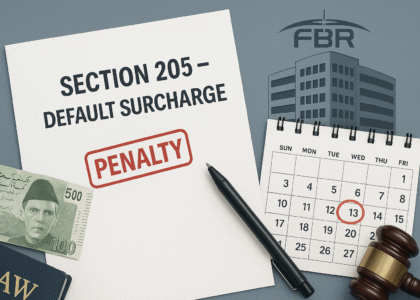Understanding of Beneficial Ownership Reporting – in Line with Notification SRO 1117(I)/2023 of the Federal Board of Revenue (FBR)
New Regulations to Transform Tax Accountability
In a significant stride toward enhanced financial transparency and tax accountability, Pakistan’s Revenue Division, in collaboration with the Federal Board of Revenue (FBR), has introduced sweeping reforms by SRO 1117(I)/2023 to the Income Tax Rules, 2002. These changes primarily revolve around the crucial aspect of reporting beneficial ownership. This article comprehensively explores the intricacies of these reforms, their implications, and the responsibilities imposed on businesses and organizations.
Read More Articles
Introduction: Shaping a Transparent Fiscal Landscape
In pursuit of a more transparent and accountable fiscal landscape, Federal Board of Revenue (FBR) has taken a significant step by introducing amendments to the Income Tax Rules 2002. The core objective behind these reforms is to establish a robust framework for the reporting of beneficial ownership.
The Significance of Beneficial Ownership Reporting: Unveiling the Control Behind Businesses
Beneficial ownership reporting entails the identification of individuals or entities that exert ultimate control or derive benefits from a company or association of persons (AOP). Essentially, it delves into who truly calls the shots within an organization. This concept holds immense significance as it serves as a formidable deterrent against tax evasion.
Implications for Companies and AOPs: Navigating the Reporting Landscape
These regulatory changes apply to every company and association of persons (AOP) operating within Pakistan’s jurisdiction. New entities must furnish beneficial ownership information during the registration process, while existing organizations are required to update this data by the stipulated deadline of December 31, 2023.
Special Considerations for Non-Profit Organizations: Transparency in the Charitable Sector
Even non-profit organizations are not exempt from these regulations. Beneficial owners within such organizations are determined based on roles like settlor, trustee, founder, promoter, or beneficiaries. However, if the beneficiaries constitute the general public, they are spared from the reporting requirements.
The Reporting Process: Steps to Ensure Compliance
Compliance involves furnishing comprehensive information about beneficial owners. This includes their names, dates of birth, nationalities, identification numbers, ownership percentages, acquisition dates, and residential as well as commercial addresses.
Record Retention: Securing the Trail of Beneficial Ownership
Ensuring accountability, every company and AOP must maintain records of beneficial owners for a decade following the cessation of their beneficial ownership. Simultaneously, the FBR (Federal Board of Revenue) shoulders the responsibility of preserving these records for registered entities.
Conclusion: Advancing Fiscal Transparency
As Pakistan marches forward in its quest for fiscal transparency and accountability, these amendments to the Income Tax Rules stand as a significant milestone. Businesses, both corporate and non-profit, need to remain vigilant and comply with the reporting requirements set forth by the FBR (Federal Board of Revenue).
The introduction of beneficial ownership reporting heralds a new era of fiscal responsibility, one that strives to create a level playing field for all entities and strengthen the nation’s fiscal landscape.
Read More Articles
Check : S.R.O. lll7T(I)/2023 issued by Revenue division on 28-August-2023.
Powered By EmbedPress
The notification of SRONO.1117(I)/2023 introduces a new chapter, Chapter XIIIA, which deals with the record of beneficial owners for tax purposes. Here’s a summary of the key points in this notification:
Application of Chapter: The rules outlined in Chapter XIIIA are applicable for the purpose of Section 181E of the Income Tax Ordinance, 2001, which pertains to the record of beneficial owners.
Furnishing of Particulars: Every company and association of persons (AOP) must electronically provide the details of their beneficial owners to the FBR. New registrations with the FBR should do this at the time of initial registration, while existing companies and AOPs must provide this information by December 31, 2023.
Updating Beneficial Owner Records: Companies and AOPs are required to update their beneficial owner records within 30 days of any changes to the provided information.
Non-Profit Organizations: For non-profit organizations, the settlor, trustee, founder, promoter, beneficiary, or class of beneficiaries will be considered beneficial owners. However, if the beneficiaries are the general public, they are exempt from this requirement.
Confirmation Certificate: If there are no changes in the beneficial owners throughout a tax year, a company or AOP must furnish a “Certificate of Confirmation for Beneficial Owner” along with their income tax return for that year.
Definitions: The document provides definitions for various terms used in the context of beneficial ownership, such as “chain of ownerships,” “direct means,” “indirect means,” “joint control arrangement,” and “ultimate effective control.”
Details of Beneficial Owners: The document specifies the information that must be provided for beneficial owners depending on how they exercise control over a company or AOP. This includes information such as name, date of birth, nationality, identification numbers, percentage of ownership, date of acquisition, and residential and commercial addresses.
Cascading Process: There is a cascading process for recording beneficial ownership information, divided into three tests (Test 1, Test 2, and Test 3) to ensure comprehensive coverage.
Retention of Records: Companies and AOPs must retain the records of all beneficial owners for ten years from the date when those beneficial owners cease to be associated with the company or AOP. The FBR will also retain records for companies and AOPs registered with them for the same period.
“The power of taxing people and their property is essential to the very existence of government.”
– James Madison.
Twitter
Check More
Government Announces Diyat (Compensation) Amount of Rs 6.76 Million for FY 2023-24
Understand Tax Exemption under Foreign Investment (Promotion and Protection) Act, 2022 (XXXV of 2022)- Section 44A
FBR’s Latest Circular 03 of 2023-2024: Clarifying the Ambiguities in Circular 01 of 2023-2024 – A Detailed Analysis
New Tax Guidelines for Property Sales: Circular 01 of 2023-24 on Section 7E
Pakistan Fiscal Transparency, Beneficial Ownership Reporting, FBR Seal, SRO lllT(I) 2023, Financial Transparency, Tax Accountability, Pakistan Tax Reforms, Federal Board of Revenue, Tax Evasion Prevention, Non-Profit Transparency, Compliance Steps, Record Retention, Ownership Disclosure, Taxation Pakistan, Financial News PK, Government Regulations, Tax Fairness, Corporate Accountability, Financial Reform, Economic Transparency, Business Compliance, Non-Profit Organizations, Financial Accountability, Taxation Laws, Business Regulations
Disclaimer: The information presented in this document is intended for informational and educational purposes only. It is not a substitute for professional advice or legal guidance. While we strive to provide accurate and up-to-date information, laws and regulations may change over time, and interpretations may vary. Therefore, individuals seeking specific legal advice or guidance should consult with qualified legal professionals or relevant authorities. This document should not be considered a legal document or a replacement for authoritative legal sources. It is essential to rely on official legal documents and expert consultation for precise and current legal information and interpretation.






